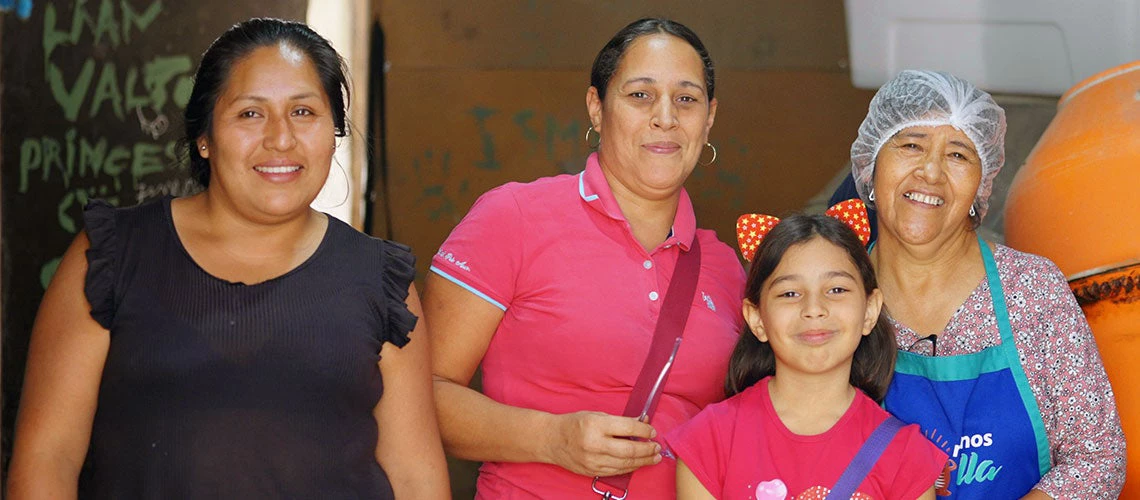 Katty, Silvia, Bárbara y Teresa, mujeres lideresas peruanas y venezolanas de las Ollas Comunes en Lima, Perú. Fotografía: Luis Carlos Parreño / 2022. Banco Mundial
Katty, Silvia, Bárbara y Teresa, mujeres lideresas peruanas y venezolanas de las Ollas Comunes en Lima, Perú. Fotografía: Luis Carlos Parreño / 2022. Banco Mundial
More than 760,000 Venezuelan migrant women live in Peru. Community kitchens have become a space for integration with Peruvian culture.
---
Moving to a country that is not our own involves significant challenges. The main one is to successfully integrate into a new environment, culture, and customs.
Perú is host to more than 1.5 million Venezuelan migrants and refugees, half of whom are women. It is particularly difficult for them to have their rights respected; they are at a greater risk of experiencing discrimination, violence, or even being involved in cases of human trafficking. Their migratory status and the absence of a support network limits their opportunities to be socially and economically included through contacts or acquaintances.
In the face of this challenging reality, community kitchens ("ollas comunes" in Spanish) have become spaces that promote the integration of Venezuelan migrant and refugee women. These groups, composed mainly of women, are essentially communal, supportive, integrative, and generators of support networks.
"The olla allowed me to meet Venezuelans. Mrs. Silvia (from Venezuela), teaches us how to cook "carotas" or prepares them and brings them to us”, said Tereza, Leader of an Olla Común, in Lima.
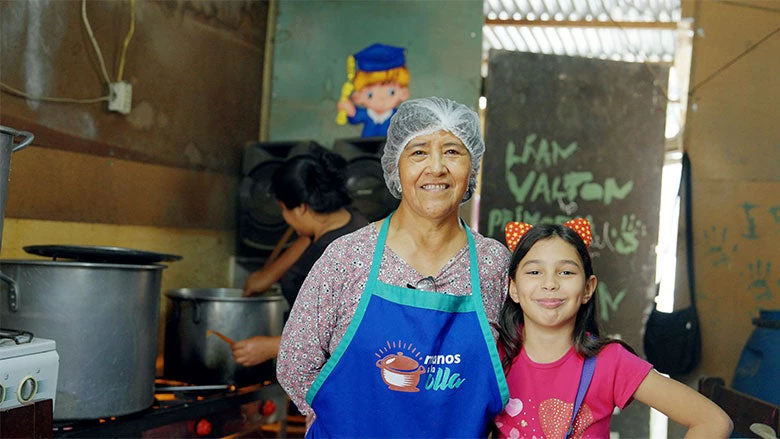
Photo: Luis Carlos Parreño / 2022. World Bank
Community Kitchens Peru
Community kitchens or the Ollas Comunes, have historically emerged in times of crisis to provide food for people in the most vulnerable environments. They originated in the 1960s, as a means to support to strikes and social mobilizations, and over time, they have emerged in response to economic crises, health emergencies, and natural disasters.
In 2020, in Peru, community kitchens were crucial in alleviating food insecurity caused by the COVID-19 crisis . By 2021, more than 3,000 community kitchens (link in Spanish) were registered in Lima, and legislation has been enacted regarding their financing at the national level. Additionally, agreements have been signed between the private sector and the Metropolitan Municipality of Lima for the reception of donations.
The characteristics of community kitchens and their integration opportunities were part of research conducted by the Municipality of Lima and the World Bank. The report “Addressing Human Rights Gaps Among Venezuelan Migrants and Refugees Considering Gender Aspects – Community Kitchens Project” (in Spanish) shows how to make the most of these spaces to promote access to human rights such as the right to food, integration, and non-discrimination, including Venezuelan women within their scope.
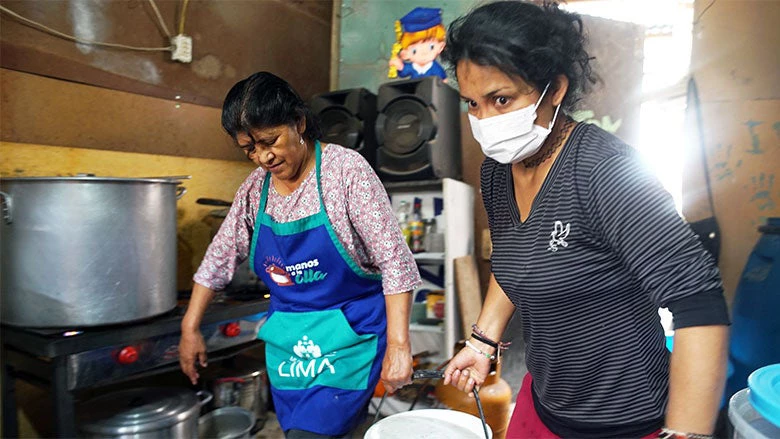
Report´s key findings and recommendations
Community kitchens—usually accessed by invitation from neighbours— are potentially beneficial spaces for knowledge exchange between Peruvian and Venezuelan women. They have become an emotionally valuable experience, evoking feelings of belonging and contributing to the creation of bonds, care networks, and emotional and material support for migrant women.
- Implement cultural, sports and social activities that allow the integration of Venezuelan migrant women and Peruvian women. Sharing experiences and common spaces creates new connections and opens up community kitchens to women who are not a part of the organization´s leaders, family or friend´s circle.
- Encourage the exchange of experiences between community kitchens from different districts to share successes and challenges, fostering both solidarity and mutual learning.
- Improve coordination, leadership, management, and conflict resolution skills, and promote education on income generation and entrepreneurship. This would aid Peruvian and Venezuelan women to realize the high value of their domestic work and make visible their contribution to the community, promoting their social and economic empowerment.
- Enable community kitchens as platforms for local development and as mechanisms to identify people in need of accessing food and other social government services, including the migrant population, through the resizing of their scope and range of action.
- Promote the acceptance of migrant people by the local community, through communication campaigns focused on human rights and inclusion, thus preventing prejudices that may arise from the information transmitted by the media.
Implementing these recommendations would open safe spaces for accessing human rights, empowerment, conversation, knowledge exchange, protection and mutual support for Venezuelan women and women in general. Communication, empathy and solidarity are just words, but when put into action, they can be truly transformative.
INFOGRAPHICS
RELATED

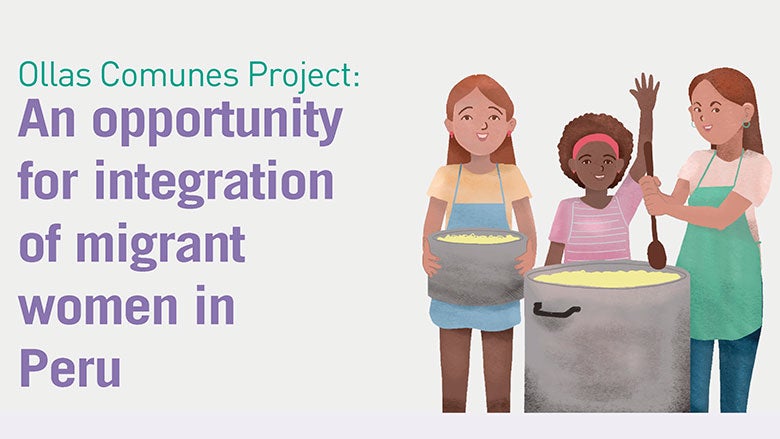
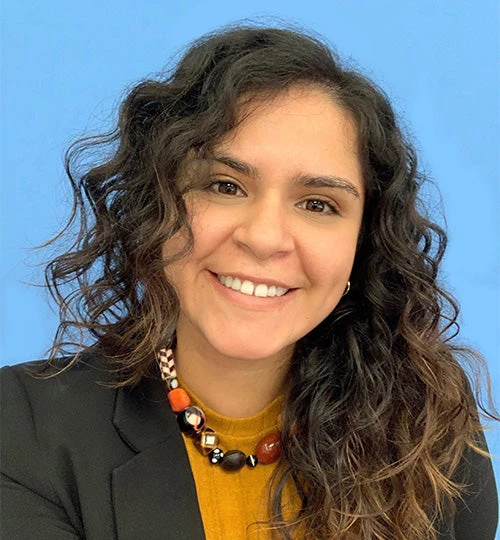
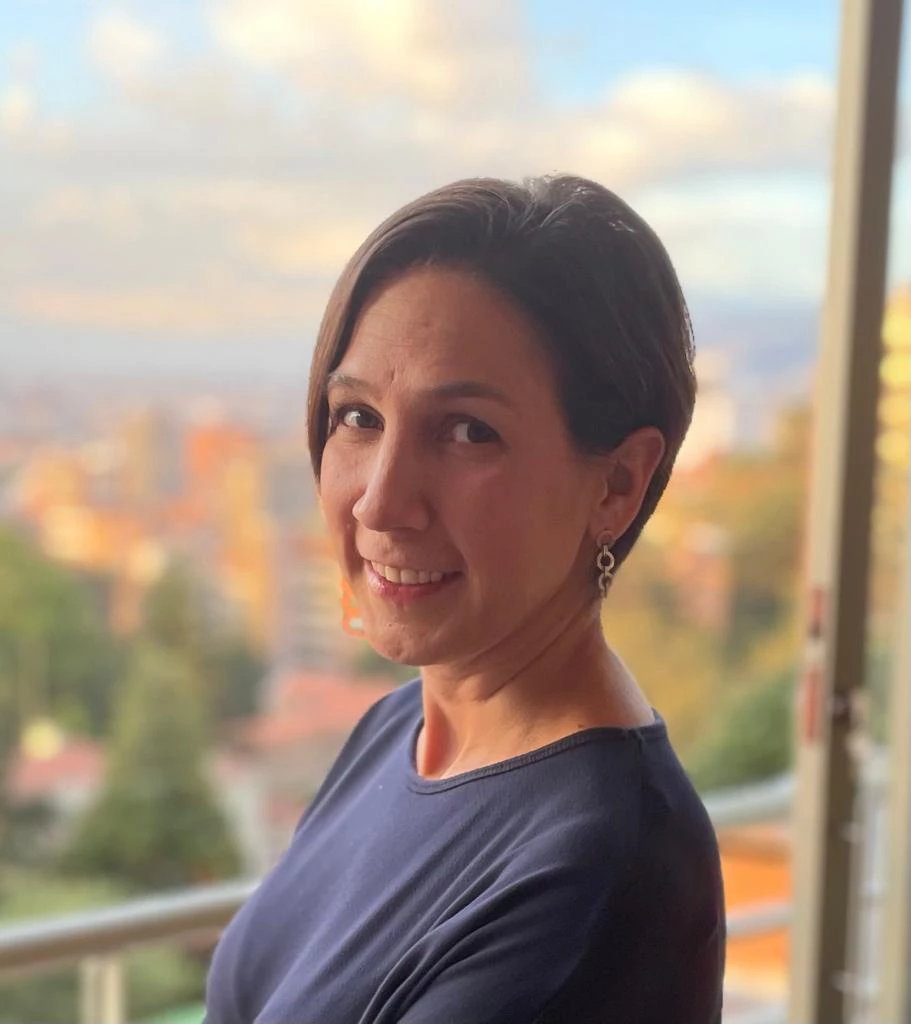

Join the Conversation